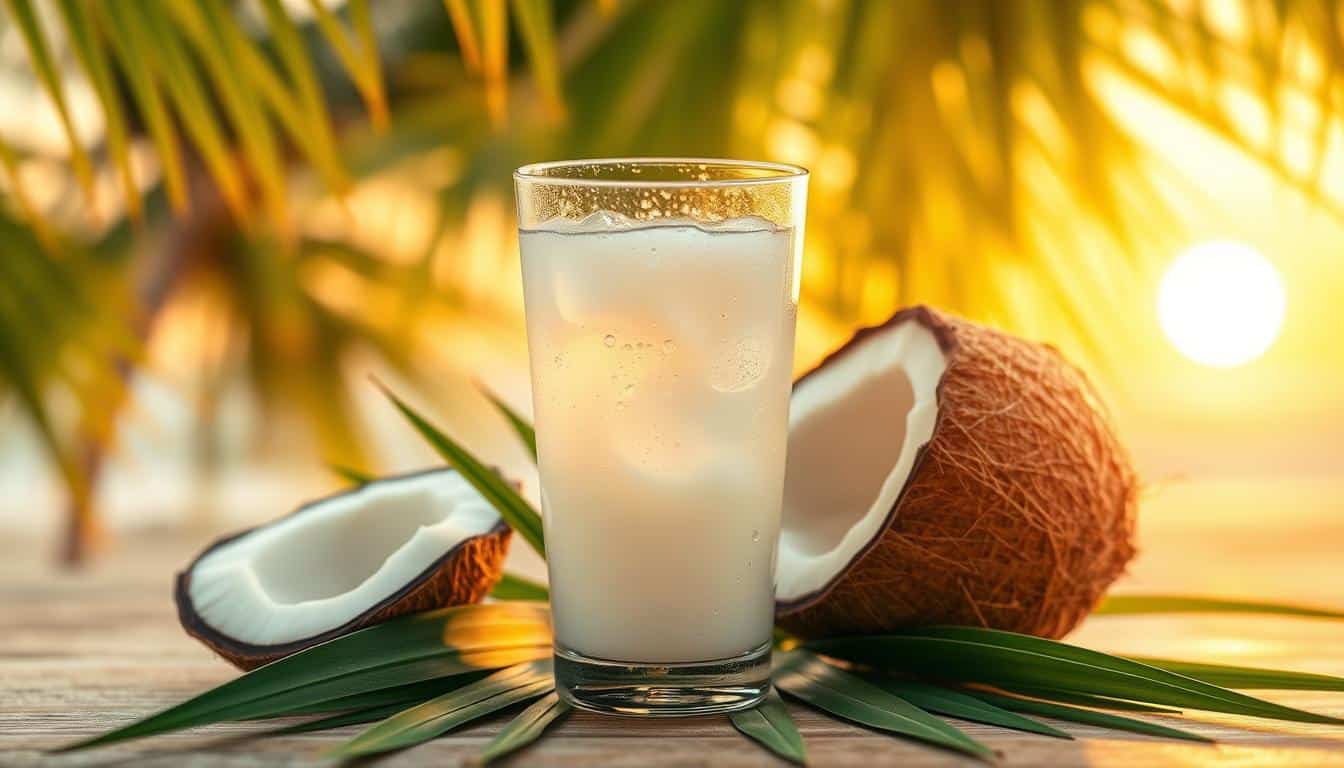Did you know coconut water packs more potassium than four bananas? This natural drink is a game-changer for active individuals. With its rich electrolyte content, it’s a powerful tool for staying hydrated during intense workouts or sports.
Studies show that coconut water can be just as effective as traditional sports drinks for rehydration. It’s a natural alternative that helps replenish essential minerals lost during exercise. Plus, it’s low in calories and free from artificial additives.
Whether you’re a gym enthusiast or a professional athlete, coconut water can support your performance and recovery. Dive in to learn how this refreshing drink can fuel your active lifestyle!
Introduction to Coconut Water Benefits
Coconut water is the clear liquid inside young coconuts, packed with natural nutrients. It’s a refreshing drink that’s low in calories and high in essential minerals like potassium and sodium. Unlike coconut milk, which is made from grated coconut flesh, coconut water is a natural fluid straight from the source.

What Makes It Unique?
This tropical beverage stands out for its electrolyte content, making it a smart choice for hydration. With just 46 calories per cup, it’s a lighter alternative to sugary sports drinks. Plus, it’s free from artificial additives, offering a clean, natural option for active individuals.
How Does It Compare?
While plain water is great for hydration, it lacks the minerals lost during intense exercise. Commercial beverages often contain added sugars and artificial ingredients. Coconut water bridges the gap, providing essential nutrients without the extra calories.
| Beverage | Calories (per cup) | Potassium (mg) | Sodium (mg) |
|---|---|---|---|
| Coconut Water | 46 | 600 | 5 |
| Plain Water | 0 | 0 | 0 |
| Sports Drink | 80 | 30 | 160 |
Whether you’re hitting the gym or recovering from a workout, coconut water is a natural way to stay hydrated and replenish lost minerals. It’s a simple, effective addition to your routine.
benefits of coconut water for athletes
Staying hydrated during workouts is crucial, and coconut water offers a natural solution. Its unique blend of electrolytes and minerals makes it a standout choice for active individuals. Let’s dive into how it supports performance and recovery.

Enhanced Hydration and Fluid Balance
Drinking coconut water helps maintain fluid balance during exercise. Studies show it’s as effective as sports drinks for rehydration. Its natural composition ensures you’re replenishing lost fluids without added sugars or artificial ingredients.
During intense activity, sweat loss can lead to dehydration. Coconut water’s high potassium content helps counteract this. With 600mg of potassium per cup, it’s a powerful way to restore balance and keep you performing at your best.
Electrolyte Replenishment for Muscle Function
Potassium isn’t just for hydration—it’s essential for muscle function. This mineral helps prevent cramps and supports recovery. Coconut water’s electrolyte profile makes it a smart choice for athletes looking to optimize their performance.
Research highlights that coconut water sustains blood electrolyte levels better than plain water. Its carbohydrate content also provides a quick energy boost, making it ideal for prolonged workouts.
| Beverage | Potassium (mg) | Sodium (mg) | Carbohydrates (g) |
|---|---|---|---|
| Coconut Water | 600 | 5 | 15 |
| Plain Water | 0 | 0 | 0 |
| Sports Drink | 30 | 160 | 13 |
Whether you’re training for a marathon or hitting the gym, coconut water can help you stay hydrated and energized. Its natural benefits make it a go-to for athletes worldwide.
Coconut Water versus Conventional Sports Drinks
When it comes to hydration, not all drinks are created equal. Athletes often debate whether to reach for a sport drink or drink coconut water. Both options have their merits, but understanding the difference can help you make the best choice for your needs.
Performance Comparison and Study Results
Research shows that coconut water and sport drinks are equally effective for rehydration. A study in the Journal of Physiological Anthropology found no significant difference in performance outcomes during exercise trials. Both beverages helped athletes maintain hydration and energy levels.
However, coconut water is water low in sodium compared to sport drinks. This makes it a better option for moderate activity but less ideal for prolonged, intense workouts. Sport drinks, with their higher sodium content, are better suited for extreme conditions.
Differences in Electrolyte Content
The electrolyte profiles of these drinks vary significantly. Coconut water is rich in potassium, with 600mg per cup, while sport drinks like Gatorade contain more sodium. This difference affects how each beverage supports muscle function and fluid balance.
For example, sport drinks are designed to replenish sodium lost through sweat, which is crucial for endurance athletes. Coconut water, on the other hand, excels at restoring potassium levels, helping to prevent cramps and maintain pressure during exercise.
Ultimately, the choice between coconut water and sport drinks depends on your activity level and personal preferences. Both are water good options for staying hydrated, but their unique formulations cater to different needs.
Nutrient Profile and Performance Factors
Ever wondered what makes coconut water a top choice for active individuals? Its nutrient profile is packed with essential minerals and carbohydrates that fuel performance and recovery. Let’s break it down.
Electrolyte Composition Explained
Coconut water is rich in magnesium and calcium, two minerals crucial for muscle function and bone strength. A single cup contains about 15mg of magnesium and 58mg of calcium. These nutrients work together to prevent cramps and support recovery.
The high potassium content, with 600mg per cup, helps regulate fluid balance and muscle contractions. This makes it a standout choice for athletes looking to maintain peak performance.
Carbohydrates and Energy Impact
With 15g of natural carbohydrates per cup, coconut water provides a quick energy boost without the crash of sugary drinks. This moderate amount of carbs is ideal for sustaining energy during workouts or aiding recovery afterward.
Young coconut water offers a unique nutrient composition compared to other beverages. Its natural sugars and electrolytes make it a go-to for active individuals seeking a clean, effective hydration solution.
Whether you’re training for a marathon or hitting the gym, the nutrient content in coconut water can help you stay energized and recover faster. It’s a simple, natural way to support your active lifestyle.
Practical Tips for Integrating Coconut Water into Your Routine
Looking for a natural way to stay hydrated and energized throughout your day? Adding coconut water to your routine is easier than you think. With a few simple adjustments, you can make it a seamless part of your active lifestyle.
Optimal Serving Size and Timing
To maximize hydration, drink 8-12 ounces of coconut water before or after your workout. This helps replenish electrolytes lost during exercise. For longer sessions, sip 4-6 ounces every 30 minutes to maintain fluid balance.
Monitoring your heart rate and physical condition is key. If you feel fatigued or dizzy, it could be a sign of dehydration. Adjust your intake based on your activity level and sweat rate.
Simple Guidelines for Daily Use
Start your day with a glass of coconut water to kickstart hydration. It’s a refreshing alternative to plain water and provides essential minerals. For those with diabetes, pair it with a balanced meal to manage blood sugar levels.
Here’s a quick guide to help you incorporate it into your routine:
| Time of Day | Serving Size | Purpose |
|---|---|---|
| Morning | 8 oz | Hydration boost |
| Pre-Workout | 8-12 oz | Energy and electrolyte replenishment |
| Post-Workout | 8-12 oz | Recovery and rehydration |
| Evening | 4-6 oz | Relaxation and hydration |
Remember, moderation is key. While coconut water is a great hydration tool, balance it with other fluids like plain water. For individuals with specific health conditions, consult a healthcare professional to tailor your intake.
With these tips, you can stay hydrated, energized, and ready to tackle your day. Small changes can make a big difference in your performance and recovery!
Research Findings and Performance Studies
Research has shown that hydration choices can significantly impact athletic performance. Scientists have conducted numerous studies to compare coconut water with other beverages like plain water and sports drinks. Let’s dive into the key findings and what they mean for you.
Laboratory Study Summaries
In controlled lab settings, researchers tested how different drinks affect hydration and performance. One study found that drinking coconut water was just as effective as sports drinks in maintaining fluid balance during exercise. Participants who consumed it showed similar improvements in performance time and endurance.
Another case highlighted its ability to regulate body temperature during high-intensity workouts. Athletes who drank coconut water experienced fewer spikes in core temperature, helping them stay comfortable and focused.
Real-World Exercise Insights
Field studies have also supported these findings. In real-world scenarios, athletes who chose coconut water reported better hydration levels and faster recovery times. For example, marathon runners who drank it during races maintained steady energy levels without the crash associated with sugary drinks.
Here’s a quick comparison of how different beverages performed in these studies:
| Beverage | Hydration Effectiveness | Performance Time | Recovery Speed |
|---|---|---|---|
| Coconut Water | High | Improved | Fast |
| Plain Water | Moderate | No Change | Slow |
| Sports Drink | High | Improved | Moderate |
Overall, the research suggests that coconut water is a reliable choice for hydration and performance. Whether you’re hitting the gym or running a marathon, it’s worth considering as part of your routine.
Conclusion
Finding the right hydration solution can make all the difference in your performance. Coconut water stands out as a natural option packed with potassium, magnesium, and calcium. These nutrients support your body by maintaining fluid balance and muscle function.
While it’s low in sodium, it’s still a great choice for moderate activity. Studies show it’s as effective as sports drinks for hydration, making it a versatile addition to your routine. Just remember to monitor your intake, especially if you have conditions like hyperkalemia.
Whether you’re training or recovering, this drink offers a clean, nutrient-rich way to stay hydrated. Give it a try and see how it can enhance your active lifestyle!


